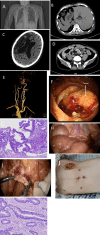Rectal cancer with situs inversus totalis and previous malignant middle cerebral artery infarction: a case report and review of the literature
- PMID: 39578876
- PMCID: PMC11585198
- DOI: 10.1186/s13256-024-04903-7
Rectal cancer with situs inversus totalis and previous malignant middle cerebral artery infarction: a case report and review of the literature
Abstract
Background: Situs inversus totalis is a rare congenital condition where there is complete inversion of thoracic and abdominal organs. There is limited information on the laparoscopic treatment of rectal cancer in patients with situs inversus totalis accompanied by other underlying conditions.
Case presentation: We report the case of a 61-year-old Chinese male with rectal cancer accompanied by situs inversus totalis, malignant middle cerebral artery infarction, stenosis of the right internal carotid artery and anterior cerebral artery, and diabetes who underwent a successful laparoscopic radical resection of rectal cancer. We discuss the diagnosis, treatment, and considerations for patients with situs inversus totalis accompanied by other underlying conditions. We performed relevant inspections, organized multidisciplinary team discussions, and made sufficient perioperative preparations. The patient had no intraoperative complications and was successfully discharged from the hospital. Pathological stage was T3N0M0, and the patient did not develop tumor recurrence or metastasis in the 24-month follow-up period.
Conclusions: We conclude that patients with rectal cancer with situs inversus totalis, even when accompanied by underlying diseases, can undergo surgical treatment with adequate preparation, and surgical treatment is the most effective treatment method.
Keywords: Case report; Laparoscopic surgery; Malignant middle cerebral artery (MCA) infarction; Rectal cancer; Situs inversus totalis (SIT).
© 2024. The Author(s).
Conflict of interest statement
Declarations. Ethical approval and consent to participate: Not applicable. Consent for publication: All authors of the manuscript have read and agreed to its content and are accountable for all aspects of the accuracy and integrity of the manuscript in accordance with ICMJE criteria; and that the article is original, has not already been published in a journal, and is not currently under consideration by another journal. Written informed consent was obtained from the patient for publication of this case report and any accompanying images. A copy of the written consent is available for review by the Editor-in-Chief of this journal. Competing interests: No competing interests.
Figures

References
-
- Yuwen W, Ma Jingfeng Wu, Wei. One case of splenectomy and devascularization with total visceral inversion combined with portal hypertension. Chin J Hepatobiliary Surg. 2012;18(2):117–117. 10.3760/cma.j.issn.1007-8118.2012.02.011.
-
- Hacke W, Schwab S, Horn M, Spranger M, De Georgia M, von Kummer R. ‘Malignant’ middle cerebral artery territory infarction: clinical course and prognostic signs. Arch Neurol. 1996;53(04):309–15. 10.1001/archneur.1996.00550040037012. - PubMed
-
- von Sarnows ki B, Kleist-Welch Guerra W, Kohlmann T, et al. Long-term health-related quality of life after decompressive hemicra- niectomy in stroke patients with life-threatening space-occupying brain edema. Clin Neurol Neurosurg. 2012;114:627–33. 10.1016/j.clineuro.2011.12.026. - PubMed
-
- Poca MA, Benejam B, Sahuquillo J, et al. Monitoring intracranial pressure in patients with malignant middle cerebral artery infarction: is it useful? J Neurosurg. 2010;112:648–57. 10.3171/2009.7.JNS081677. - PubMed
Publication types
MeSH terms
LinkOut - more resources
Full Text Sources

